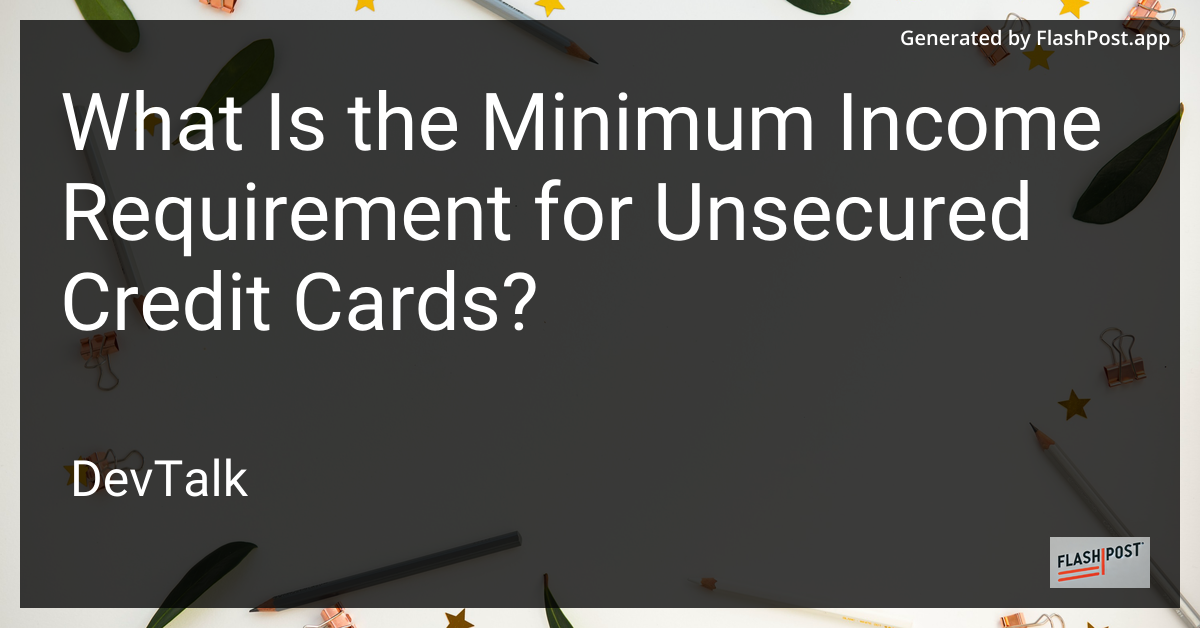What Is the Minimum Income Requirement for Unsecured Credit Cards?

What is the Minimum Income Requirement for Unsecured Credit Cards?
In the world of personal finance, obtaining an unsecured credit card can be a significant milestone.
Unlike secured credit cards, unsecured cards do not require a security deposit, making them highly attractive for individuals seeking to establish or improve their credit score. However, before you can enjoy the benefits of an unsecured credit card, you need to meet certain eligibility criteria, one of which is the minimum income requirement. Let's delve into what this means and how it could affect your financial opportunities.
Understanding Unsecured Credit Cards
Unsecured credit cards offer a revolving line of credit that allows cardholders to make purchases, earn rewards, and utilize credit without collateral. Since there's no security deposit involved, lenders take on more risk, making income verification a crucial part of the approval process. Your income is often checked to ensure you have the financial capacity to make monthly payments. This brings us to the next critical aspect — the minimum income requirement.
Minimum Income Requirement for Unsecured Credit Cards
The minimum income requirement varies greatly among different card issuers and types of credit cards. While some basic unsecured credit cards might approve applicants with annual incomes as low as $12,000 to $15,000, premium and rewards cards might have much higher income thresholds. Factors influencing these requirements include:
-
Credit Risk: Lenders evaluate the risk of extending credit to you. A stable income indicates reliability, reducing the perceived risk.
-
Credit Limit Request: If you’re requesting a higher credit limit, the issuer will likely need assurance of a higher income to support the additional credit exposure.
-
Debt-to-Income Ratio: Even with a substantial income, high existing debts can make meeting the income requirement challenging.
Steps to Take If You Don't Meet the Minimum Requirement
If your income doesn't meet the minimum requirement for an unsecured credit card, do not lose hope. Here are some alternative steps you can take:
-
Consider a Secured Credit Card: These cards require a refundable deposit, making them accessible to those with lower incomes.
-
Explore Cash Loans Without Credit Checks: If establishing credit is your primary goal, you might consider exploring options like cash loans with no credit check.
-
Review Government Assistance or Tax Benefits: If income is a concern, exploring tax credits could offer some financial relief.
-
Improving Your Financial Health for Future Opportunities: Working to improve your credit score can increase your chances of card approval. Learning about how payday loans and credit scores in 2025 could potentially impact your score is a step towards better financial literacy.
Conclusion
Meeting the minimum income requirement is crucial for obtaining an unsecured credit card. It demonstrates to lenders that you have a stable source of income to manage credit responsibly. However, if you currently fall short of the necessary income levels, there are alternative paths to building your credit and eventually qualifying for the card of your choice. Remember, improving your overall financial health will enhance your prospects across the board, increasing both credit opportunities and personal financial security.
This markdown article provides valuable insights into the minimum income requirement for unsecured credit cards and guides readers with linked resources for further exploration.